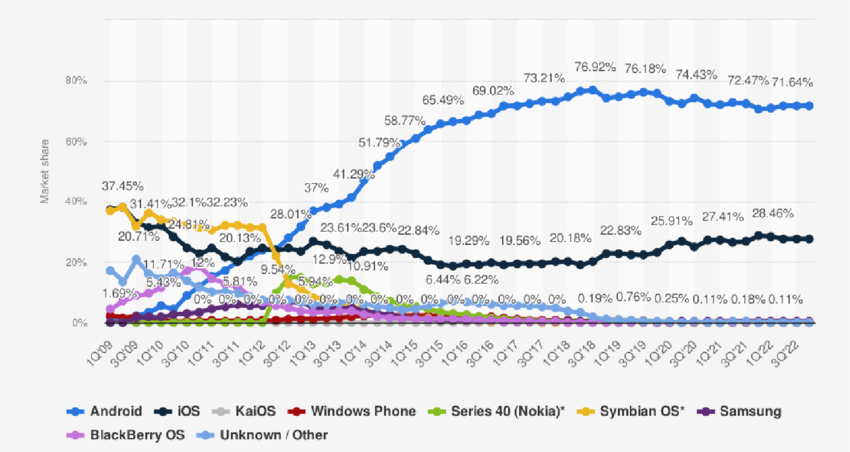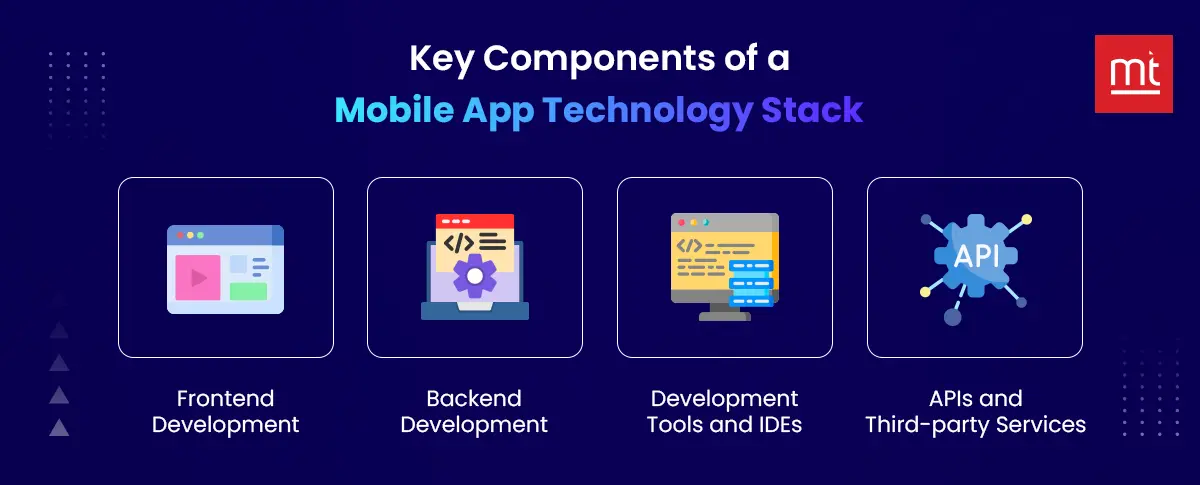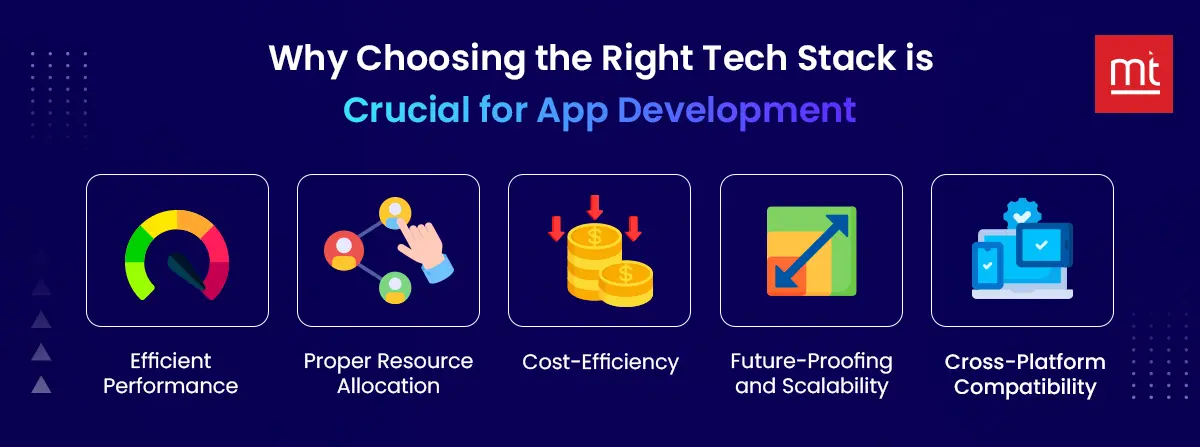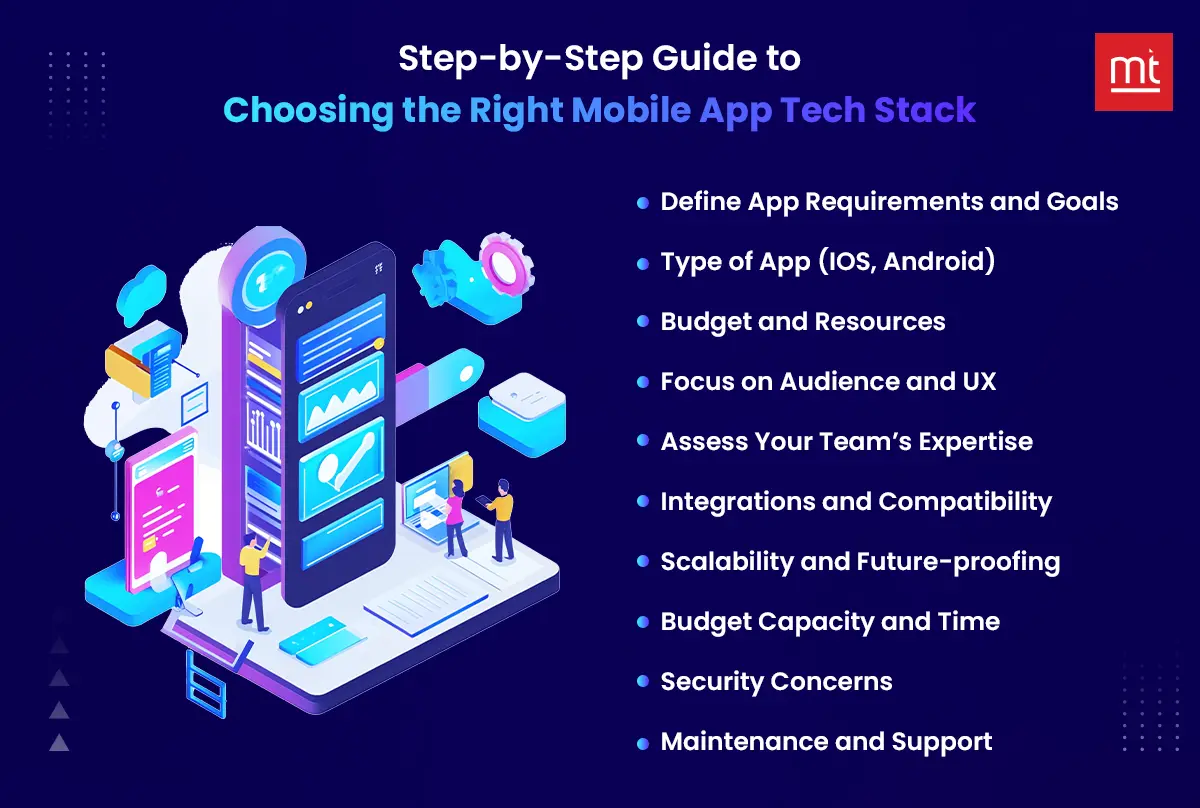Get Free Trial Week Developer Access, Try Before You Hire. Click Here to Claim Now
Key Takeaway:
Have an idea to build a mobile application for your next project? But concerned about which mobile app development technology stack is best for your next project? In the digital era, the mobile app development market is rapidly rising, hence you may have a lot of questions arising in your mind, such as:
1. How do you choose the best tech stack for mobile apps?
2. What are the key components of a mobile app development technology stack?
3. Which company provides the best technology stack for app development?
4. What are the Latest Emerging Mobile App Tech Stacks?
Here, learn the step-by-step guidelines of the mobile app development technology stack from your ManekTech expert, and make it a reality in your next projects.
Introduction to Market Share in Mobile App Development Technology
With the growing use of online technologies, the use of mobile apps has been highly revolutionized in the past few years. If we use some statistical data, there is over 8 billion human population, and of that 6.92 billion are smartphone users, which clearly shows over 86% of the human population uses mobile apps on a daily basis. Mobile app development is definitely a profitable industry that will reach a $756 Billion market by 2027.
According to statista research, total revenue of the app market is expected to show an annual growth rate (CAGR 2022-2029) of 7.48%, resulting in a projected market volume of US$781.70bn by 2029. As per the global market, Android has secured 70.7% of the market and IOS has covered 28.5%. (Statista)

If you are an individual or business owner who is involved with the mobile app development services, then this article is worth reading for you. This article guides you through the importance of choosing the right tech stack, key components, factors, and more to help you choose the best mobile app technology for a smooth-going project.
What Is a Technology Stack for Mobile App Development?
The technology stack is the basic building block of mobile app development that includes a combination of software components, libraries, programming languages, frameworks, tools, and other UI UX design solutions.
Depending upon the nature of mobile apps, whether it's android app development, or iPhone app development, they can have different tech stacks. Most mobile tech stack has two main software components which are client-side and server-side.
What are the Key Components of a Mobile App Technology Stack?
There are four key components of the mobile app development tech stack such as Frontend & Backend Development, Development Tools, and IDEs. To understand in-depth, let's understand the key components of the mobile app technology stack.

1. Frontend Development
Frontend development refers to client-side development that includes building a graphical interface to allow users to interact with the app. In simple words, this is where developers design app UI, layout, buttons, animations, logic, and other functionalities.
For Android, developers mainly use Swift for iOS and Kotlin for Android. Keeping cross-platform compatibility in mind, React Native, Flutter and Xamarin are popular platforms.
Read More: Is Flutter the future of Cross Platform App Development?
2. Backend Development
Backend development refers to handling all the behind-the-scenes, database operations, and app logic. It is basically a server-side developer that involves scripting, web architecture, and a database to interact with the app seamlessly. Developers use server-side languages like Node.js, python, ruby, and Java for server-side operations and for database management, popular options are SQL, NOSQL, firebase, etc.
3. Development Tools and IDEs
Development tools and IDEs like Xcode, Android Studio, Visual Studio, and Version control (Git, GitHub) are essential for mobile app development to build and test the app smoothly. With the help of effective tools, the mobile app can be easily completed with real-time testing and enhance the development process for faster time to market.
4. APIs and Third-party Services
APIs and useful third-party services are vital components of the mobile app tech stack that enables payment gateway integration for secure payment. API Developers can add social media integration and make use of analytics tools to collect useful data from users and make improvements to the app.
Why is it Important to Choose the Right Tech Stack for App Development?
It is crucial to choose the right technology stack for your app development because it requires extra caution during the initial phase of mobile app development to run a successful app, such as performance, development time, support, and maintenance, and cost-efficiency, future-proofing and scalability. Below are some reasons to choose the best tech stack for building mobile apps.

1. Efficient Performance
When you choose the right technology, it can solve half of the problems during app making. Feel free to integrate performance monitoring tools like Datadog and more to continuously optimize the app performance and keep it free from glitches.
2. Proper Resource Allocation
It helps to future-proof your app by considering scalability and resource allocation. Depending on the type of app you develop, resource needs might vary hence you can guide your assignment of the task to the right expert who has knowledge of using specific tools or resources.
3. Cost-Efficiency
The right tool will save you money, and time, and prevent you from lots of confusion and unusual efforts. This can help you save overall development costs by using resources wisely and meeting budget constraints.
4. Future-Proofing and Scalability
Using the right tool will always keep you ahead from market constraints and apps relevant. Hence you can easily scale up and down on mobile app changes to meet changing market demand.
5. Cross-Platform Compatibility
When you are very clear about your mobile app project and pick the right technology, you can also fulfill cross-platform support functionality. Prefer to react native or Flutter for seamless code sharing and run your app on any platform.
💡 Expert Insight
Based on the key components, our ManekTech ‘s app developers use our client projects to build fantastic apps that generate more ROI with reduced costs.
How to Choose the Best Mobile App Tech Stack- Step-by-Step Guide?
Now let's get back to the main point to answer your question “How to choose the right tech stack”, here is a quick overview of the app's requirements and goal, types of app, budget and resources, consider security and performance, support & maintenance, and etc. We have mentioned all the best points through our experience and research for selecting the best tech stack for mobile apps. Let's dive in!

#1. Know Your App's Requirements and Goal
The success of your app is bound to its goal and user requirements. Be clear about what is the motive for making the app and what problem it is going to solve. Is it for business purposes?
💡Consider all the important points like app features, security, scalability, functionalities, performance, and other essential factors before you choose the technology stack.
#2. Type of App (IOS, Android)
Next is to decide on what type of app you want to make. Whether it's an Android app, iOS app, native, hybrid, or cross-compatible app. Based on the type of app, complexity, and business objective, decide the right platform to develop a mobile app.
💡For the Android app, we recommend you Kotlin or Java language with Android Studio and Android developer toolkit. For the IOS app, swift and Objective-C are suitable choices.
#3. Budget and Resources
Once you have finalized the programming languages, tools, platform, frameworks, and everything, you will get a rough idea of the budget.
💡Check whether the technology stack you have chosen is easy to use or needs any learning or needs to hire a mobile app developer.
#4. Target Audience and User Experience
Consider your target audience because the tech stack will directly affect the user experience. If your aim is a mobile-friendly app and good user experience, you must choose the tech stack that fulfills the user experience factor.
💡Follow a user-centric approach and understand the main objective of your audience and the features they want.
#5. Evaluate Development Expertise
Know whether your team is capable enough to use that specific tech stack. Analyze the skills of your development team to understand their experience.
💡Know if your team needs learning or any kind or training. If you have a budget you can also hire mobile app developers on short notice.
#6. Check Third-party Integrations and Compatibility
Check whether the tech stack you choose is compatible and needs any third-party integrations or not.
💡The technology should be easy to integrate with any API or third-party tool.
#7. Scalability and Future-proofing
Keep your future business plans in mind while you choose a tech stack so the necessary changes can easily be made in the app without adding more cost.
💡 Choose the flexible technology that can be scaled horizontally and vertically to meet the mobile app needs.
#8. Budget Capacity and Time
Do you have a large-scale project or a small one? All things depend on the tech stack you choose, because you will get an estimation according to your app development budget and the time it will take to complete the mobile app.
💡If you are short on budget, consider open-source tools and services that do the job well and also save time.
#9. Consider Security and Performance
Have you compromised on security and privacy features for your app? Don't compromise on app security and performance just to save a few bucks. App security and performance are like two balancing wheels that determine the success of the app.
💡You should select the tech stack that meets your security guidelines and follows data encryption and robust protocols.
#10. Maintenance and Support
App-making is a continuous process, there is no full stop but it comes with many commas from time to time. you must consider whether the tech stack you have chosen is able to provide maintenance and ongoing support with the evolving times.
💡Check whether they have good community support to help with the issues related to the tech stack.
Latest Emerging Trends Mobile App Tech Stacks
Do you want to know the latest emerging trending app tech stacks for upcoming app development projects? Here, our ManekTech’s experts explore current trending app tech stack such as AI & Machine Learning Integration,5G technology, cloud native development, Low-code/No-code Tools, IoT mobile integration, AR and VR etc..
Why Should You Use it?
As mobile app development keeps changing, including new trends in your tech stack choices can help your app stay relevant, attract users early, stay ahead of competitors, and generate more ROI. Today, most mobile app development agencies in the USA, India, the UK, and across countries use these emerging tech stacks and fulfill their clients' wishes.
1. AI & Machine Learning Integration
Features for Mobile App:
- Most Popular Trending Technologies
- Smart & Personalize Recommendations
- AI Chatbots Support
- Voice/Image Recognition
- Predictive Analytics
- Real-Time Decision Making
Why Choose?
- Boosts personalization
- Automate Process
- Improve Decision Making
- Enhance Customer Support
Example of AI & ML:
- Google Lens use AI for Image Recognition
- Spotify use ML to Personalize Data
2. 5G Technology and AR & VR
Features of Mobile App:
- Immersive AR and VR Experiences
- 5G Enables Real-time Interaction
- Ultra-low Latency Communication
Why Choose?
- Demand for immersive real experiences
- Enable interactive Experience
- 5G helps faster data transfer
- 5G have more reliability and massive network capacity
Example of 5G Technology and AR & VR:
- Snapchat uses 5G to enhance real-time video effects & Augmented Reality filters.
- BMW uses 5G enabled AR for virtual showrooms effects.
3. Cloud Native Development
Features of Mobile App:
- Independent Manageability,
- Enhanced Flexibility & Scalability
- Improve Security
- Faster Deployment Cycles
- Seamless Data Sync
Why Choose:
- Reduce Downtime and Cost
- Faster Time to Market
- Protect Data and Application from Treats
- Improve Performance
- Enhance Customer Experience
Example of Cloud Native Development:
- Capital One is largest retail bank uses cloud native principles
- Airbnb use Microservices to manage diverse range of data and built this platform on AWS cloud infrastructure
4. Low-code/No-code Tools
Features of Low-code/No-code Tools:
- Visual Development Tool
- Drag-and-drop Interface
- Pre- built Templates and Component
- Built-in Security Features
Why Choose:
- Faster Development Process
- Lower Cost & Save Development Time
- Enhance Customer Experience
- Suitable for MVPs, complex & feature-rich applications
Examples of Low-code/No-code Tools:
Mendix provides a low-code platform for developing web and mobile apps.
Zoho Creator uses Low-code/No-code to automate processes.
5. IoT Mobile Integration
Features of Mobile Apps:
- Collect and Analyze Data from Connected Devices
- Improve Personalize User Experiences
- Real-time Control of Devices, Notifications from Sensors, Usage Analytics.
- Secure Data Encryption & User Authentication
- Integration of Various IoT Devices
Why Choose:
- Better User Experience
- Fast Data-driven Insights
- Improved Connectivity
- Significant Cost Savings for Businesses
- Improve Security
Example of IoT Mobile Integration:
Samsung SmartThing use IoT integration to help to enable users monitor and manage their appliance and security system.
Tesla interacts with IoT sensors that help users to showcase real time information about their vehicle such as location, battery status, etc.
How Can ManekTech Help You in Choosing the Right Tech Stack for Your Mobile App?
We understand how important it is to choose the best tech stack for mobile app development so we offer the tried and tested solution by identifying your mobile app objectives. Our 450+ expert teams of developers have 14+ decades of experience in Mobile app development industries and expertise in using various tools for android app development and iOS app development hence we are highly confident to consult you with the best mobile app development service.
With our deep knowledge and proven mobile app experience, we go through strategic planning, data analysis, testing, app design, and many other things to help you choose the perfect tech stack.
Conclusion
Honestly speaking, it needs a lot of research, patience, effort, budget, and technical knowledge to make the right decision for the mobile app tech stack. Once you are clear with the app's goals, features, target audience, performance priority, and other things, things will start to unfold on their own.
We hope you found the above article helpful in exploring the various aspects and making a suitable choice for the tech stack. If you still need any help, we are just a click away to hire mobile app developers, you can book a consultation call to get your expert opinion.

Frequently Asked Questions about Mobile App Tech Stack
Q1: Can a full stack developer build a mobile app?
Ans: Yes, it's possible to build applications. Both the frontend (mobile user interface) and backend (APIs, databases) can be developed by a full-stack developer.
They frequently use PHP, Node.js, Django, JavaScript, etc, for backend services and React Native or Flutter for mobile apps.
Tips: Hire Full-Stack Developers from ManekTech for MVPs or startups.
Q2: What is the best tech stack for a mobile app in 2025 and beyond?
Ans: The highest demand tech stack in 2025 and upcoming years for mobile apps are:
- Frontend: React Native and Flutter
- Backend: PHP, Django, JavaScript, and Node.js
- Database: PostgreSQL, MongoDB, and Firebase
- Cloud & DevOps: Docker, Kubernetes, and AWS
- AI/ML: OpenAI APIs, TensorFlow Lite
Q3. What is the best technology stack for my mobile app?
It depends on your requirements, but our expert's research here is the following:
- Native and Cross-Platform App - Flutter & ReactNative.
- Backend Technologies - Node.js, Django, Firebase.
- High personalization - AI/ML.
- Fast media delivery -5G technology.
- Scalable backend -Cloud-native & Microsecurity.
- Quickest MVP delivery-Low-code/No-code.
- Connected devices - IoT Integration.
Q4: How much does it cost to develop an app with these technologies?
The costs to develop an app with this technology stack depend upon your requirements, complexity. designer and developer location, Integration latest stack and support & maintenance. But, as per the research estimated costs are:
- Low-code MVP: $5,000–$15,000
- AI or IoT-enabled apps: $30K–$100K+
- Cloud-native enterprise app: $50K +
Q5: Which technology stacks provide the best return-on-investment (ROI)?
- Flutter and React Native are the most trending and popular technologies for Mobile apps.
- Artificial Intelligence/Machine Learning are the most demanding emerging technologies.
- Low-code gives speedy ROI through rapid launches.
- Cloud-native reduces downtime, lowers infrastructure costs as you scale.
Subscribe to Our Newsletter!
Join us to stay updated with our latest blog updates, marketing tips, service tips, trends, news and announcements!



![How Much Does It Cost to Build a Mobile App? [Checklist]](https://www.manektech.com/storage/blog/image/1765777729.webp)

















